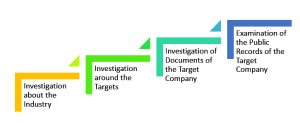In this blog post, Pramit Bhattacharya, Student, Damodaram Sanjivayya National Law University, writes about the principle of due diligence in cases of mergers and acquisitions. The post also highlights the importance of due diligence from a strategic point of view. The blog post also looks into the steps and factors involved in the process of due diligence in cases of mergers and acquisitions.
Due diligence can be defined as a continuous process through which companies, corporates, and entities ensure that rights of the stakeholders are being protected and also the entity do not contribute to any conflict. Due diligence is both a proactive and a reactive process.[1] In simpler words, due diligence can be considered as the process which any corporation undertakes which brings to light the negatives and positives impacts of any significant transactions such as securitization, the issue of securities, financing of a project, mergers, acquisitions, etc.[2] The primary motive behind the process of due diligence is to minimize the level of unknown risks and liabilities as much as possible. Due diligence is a very dynamic process and covers almost all the facets of a business operation like accounting, finance, tax, etc. Due-diligence hasn’t been denied in any statute. Nevertheless, the Securities and Exchange Board of India (SEBI) makes it mandatory for certain parties to undertake the process of due diligence when the securities of a company are being issued.
The business world has expanded a lot in the present age. Policies of liberalization and globalization are helping corporate houses and companies to expand their business all over the world. In such a scenario, corporate governance, and due diligence is very vital. Both have a very wide field of ambit, and sometimes these areas overlap each other. Every company or entity, regardless of their size and location, should give high priority to corporate governance and due diligence if they want to survive in the market.
Due Diligence from a Strategic Point of View
Due diligence relates to many sectors of business. Legal and financial due diligence by a corporate determines the potential benefit of a deal and if the deal is being done at the right price and cost or not. Strategic due diligence looks into the question that whether such a potential deal is realistically possible or not, however, good the deal may look. Strategic due diligence tests the rationale behind any deal by ascertaining whether the deal is commercially viable or not and whether the company can achieve the target value they have set for themselves. The first issue requires examination and consideration of external factors. The second issue demands an internal focus. When looking at the bigger picture, it can be realized that strategic due diligence ensures that no two transactions are treated in the same manner. Each transaction has its positives and negatives, and thus, the process must take different considerations for different transactions. This is what makes strategic due diligence so important. 
When a company is analyzing its business for any merger, acquisition, investment while considering the past and present trading performance, it is a very easy process. But when it comes to future strategies, the process becomes a bit complicated, as there may be many unforeseen issues which the company or the entity did not consider. Due diligence from a strategic point of view thus, makes sure that all the factors are taken into consideration and acts as a transaction-screening filter. The company must ensure that the deal is not only viable and beneficial in the long run, but the entity also can achieve the targets.
Due Diligence in case of Acquisition and Mergers
Due diligence becomes critical in the event of a merger or acquisition. No two entities have the same set of rules, goals, and cultural values. Each company has a different investment policy, leadership style, work environment, communication networks, etc. in such a scenario due diligence plays a crucial role. It ensures that the two companies change and adapt to different environment smoothly, and to what extent, the change and adaptation are possible. If there is a wide cultural gap between the two entities, the complicated the process of merger or acquisition will be. Due diligence considers several factors which are vital in the integration of different entities in case of a merger or acquisition.
Workforce Assessment
The total operating cost and efficiency of a company depends on the number of employees, and their way or working. The way in which the labor force of an organization is also distributed has a significant impact on the efficiency of an organization. Thus, it becomes crucial to determine whether the employees allotted to each job category is at the optimal level or not. If it is not at the optimal level, the company should allocate them to different jobs as per their skill inventory to get the best out of them.
Remuneration
Remuneration of the employees is one of the most important issues that is to be considered. It is one area which takes a longer time to resolve. If the staff in an organization is underpaid, the other organization which is acquiring or merging has to spend a lot to bring the labor force at the market price, because a massive hike in the wages is an almost impossible task. In case the staff is overpaid, then the organization will have to pay them out of their pockets and incur extra expenses. Therefore, it is important that the market position and remuneration data is ascertained before a pending acquisition or merger.
Talent and Cultural Indicators
Culture is the aggregate result of how all the individuals of the company behave in certain situations. It becomes important that members who have vital information about the behavior of the employees, or about the overall culture of the organization impart the knowledge to the other organization before a merger or acquisition. Collecting information about skills and talents of different personnel also helps in making long-term strategies. This process is vital because if a cultural conflict exists, the employees will not work to their full potential, intentionally or unintentionally.
Legal Compliances and Employee Agreements
It becomes necessary to know what type of agreement and relations did the employees had with the previous owners. Legal compliances such as mandatory insurance for the employees, trade union agreements, etc. should also be taken into account to avoid any conflicts later on.[3]
Director’s Duty in Due Diligence
A director of a company has a fiduciary relationship with the company, i.e. a relationship of trust and confidence. In furtherance of this relation, the director must act in the best interest of the company. The director has the duty to show skill and care while representing the company. It is presumed that the director, while entering into any transaction or dealing, acted in good faith and on an informed basis, and his or her actions were in the best interest of the organization. The position of a director comes with significant responsibilities. The degree of care and diligence on the part of the director should be exorbitant. Following the recent trends of the business world, it can be said that the relationship between the director and the organization is not only a fiduciary one but also an affirmative one, to protect the interest of the company. The management and the directors do not get any protection of the law in case they did not act reasonable manner and care, and due diligence was absent from their actions.
Levels in the Process of Due Diligence
Due diligence has four distinct levels. The first level involves investigation about the industry. The investigation is limited not only to the business operations but also human resource management in the industry.
The second level in the process of due diligence is investigation around the targets. Investigation at this levels focuses on the net worth of the company which the organization wants to acquire or merge into. At this stage, Directors of the acquiring company play a crucial role as they assess the potential growth. Current market position, reputation, etc., of the company to be acquired. 
The third level of the process of due diligence involves investigation of documents of the target company. The acquired company has to make certain that everything is in proper order like financial records, tax returns, regulatory and mandatory filings, etc., in some cases, the target company may not disclose all the information. Therefore, it is important for the acquirer to show due diligence and carry out the process of scrutinization properly.
At the fourth level, public records of the target company should be examined properly. Public records include records of incorporation of the organization, records of litigation if any, outstanding debts, etc.
These four levels as a whole constitute the procedure of due diligence before a merger or acquisition is done.
Concluding Remarks
With the increase in globalization, the number of mergers and acquisitions are also increasing. For any merger or acquisition to be successful, it is vital that a proper strategic due diligence is done to ascertain the risks and unforeseen liabilities which may arise in the future. When the process is carried out properly, it not only absorbs a lot of unforeseen risks, but it also helps in maintain transparency and fairness in the dealings. To learn more about mergers and acquisition, you can click here.
[divider]
Footnotes:
[1]http://www.oecd.org/daf/inv/mne/48004323.
[2]http://www.divest.nic.in/due_diligence_process.pdf
[3]Francis Cherunilam (5th edition). International Economics
 Serato DJ Crack 2025Serato DJ PRO Crack
Serato DJ Crack 2025Serato DJ PRO Crack











 Allow notifications
Allow notifications


